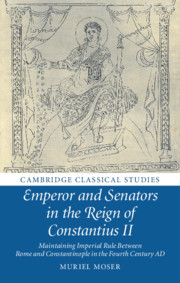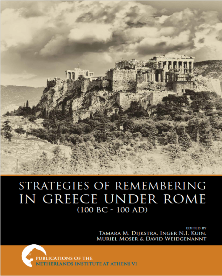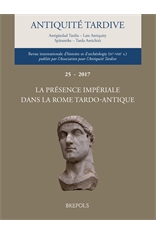- GU Home
- Fachbereich 08
- Historisches Seminar
- Alte Geschichte
- Dr. Muriel Moser-Gerber
PD Dr. Muriel Moser-Gerber: Forschungsschwerpunkte und Publikationen
(Im Reiter "Links" in der rechten Spalte finden Sie einen kurzen akademischen Lebenslauf und eine Publikationsliste)
> Griechenland im Hellenismus und der frühen Kaiserzeit
Meine Habilitationsschrift "Athens and its Roman Benefactors. From Atticus to Nero (86 BC to AD 68)" erörtert, wie sich die Stadt Athen im ausgehenden Hellenismus und in der frühen Kaiserzeit durch die Heranziehung römischer Wohltäter im römischen Reich neu positionierte.
Ich bin Mitherausgeberin eines Sammelbandes zu Erinnerungsstrategien im römischen Griechenland "Strategies of Remembering in Greece Under Rome (100 BC - 100 AD)", der 2017 in der Reihe der Publications of the NIA veröffentlicht worden ist. Darin ist mein Aufsatz zu wiederverwendeten Ehrenstatuen auf der Akropolis in Athen erschienen. Der Band ist online einsehbar. In anderen Aufsätze betrachte ich die Statuen als Teil der römischen Erinnerungskultur und hinterfrage die Nützlichkeit des Konzepts der Resilienz für die Erforschung des römischen Griechenlands. Meine Buchbesprechungen zu relevanten Themen sind in meinem Literaturverzeichnis angeführt.
> Spätantike
Meine Promotion untersuchte das Verhältnis von Kaiser und Senat in Rom und Konstantinopel unter Konstantin und Constantius II. Daraus entstand meine Monographie "Emperor and Senators in the Reign of Constantius II" , die in der Serie Cambridge Classical Studies der Cambridge University Press erschienen ist (Dezember 2018; Paperback 2022).
Ich bin Mitherausgeberin eines Sammelbandes über Women and Justice. Female Agency in Late Antique Legal Cultures (unter Vertrag bei Liverpool University Press) und des thematischen Schwerpunktes Imperial Presence in Late-Antique Rome, 3rd to 6th century in der Zeitschrift Antiquité Tardive (Band 25, 2017). Gemeinsam mit Dr. Monica Helltröm organisere ich zudem ein internationales Netzwerk zu "Spatial Strategies in Late-Antique Rome". In Aufsätzen habe ich die Rompolitik Constans' I., den Einfluss von Landbesitzern im Senat von Konstantinopel, die dynastischen Repräsentation der konstantinischen Dynastie sowie dem Ausbau von Häfen unter Constantius II untersucht. Ich habe auch zahlreiche Publikationen über spätantiken Themen rezensiert.
> Macht(voll) sprechen
Ich interessiere mich auch für antike (und moderne) Diskussionen über die Dynamik von Sprechakten und Macht. So habe ich mich eingehend mit den Skandal um Clodia in Ciceros Gerichtsrede Pro Caelio auseinandergesetzt, in der Cicero Clodia machtvoll diffamiert. In anderen Studien stehen öffentliche Sprechakte antiker römischer Frauen und Männer im Mittelpunkt (von römischen Kaiserinnen, von spätantiken Kaisern und von Frauen vor römischen Gerichten). In jüngster Zeit widme ich mich auch den öffentlichen Spechtakten von Frauen im klassischen Athen. Für diese Studien ziehe verschiedene Textquellen (Geschichtsschreibung, Gerichtsreden, Drama, Philosophie, Poesie), Inschriften und Bildquellen heran.
> Allgemein
- Ausübung und Etablierung von politischer Macht und imperialer Herrschaft
- Ähnlichkeiten, Unterschiede und Übergänge zwischen der griechischen und der römischen Kultur
- Sprechakte und Macht
- Frauengeschichte
- Resilienz
- Griechische und römische Epigraphik
- Prosopographie/Personengeschichte
- Steuern, Verwaltung und Recht
--------------------------
> Projekte, Konferenzen, Panels (thematisch geordnet in Auswahl)
Why were inscriptions reused or reinscribed?: BES Third Epigraphic Conversation
Im
Namen der British Epigraphic Society habe ich am 28. Mai 2021 ein
Expertenpanel organisiert und geleitet, dass die Wiederverwendung von
Inschriften in der Antike debattierte. Eine Beschreibung des Panels, der
Vortragenden und Teilnehmer*innen finden Sie hier.
SFB-Teilprojekt
A 02: „Vergangenheit als politische Ressource: Erinnern als Strategie
in Griechenland unter römischer Herrschaft“ (01.2015 – 12.2018).
Im
SFB 1095 „Schwächediskurse und Ressourcenregime“ habe ich das TP A 02
geleitet.
Strategies of Remembrance in Greece under Rome
Internationale Konferenz (19.- 21. Oktober 2016, Athen) zu Strategien
des Erinnerns im römischen Griechenland, in Zusammenarbeit mit dem DAI
Athen, der Universität Groningen und dem NAI Athen. Weitere
Informationen zur Konferenz finden Sie hier. Die Beiträge zur Konferenz sind 2017 in einem Sammelband erschienen (s.o.).
Netzwerk Spatial Strategies in Late-Antique Rome (SSILAR), gemeinsam mit Dr. Monica Helltström (Oxford), 2020-2024.
Imperial Presence in Late-Antique Rome, 3rd to 6th Century A.D.
Internationale Konferenz (20.- 22. März 2015, Frankfurt am Main) zur
kaiserlichen Präsenz im spätantiken Rom. Weitere Informationen finden
Sie hier. Die Beiträge der Konferenz sind, um 4 Aufsätze ergänzt, in Antiquité Tardive 25 (2017) erschienen.
"Frauen als Rednerinnen von der Antike bis ins 20. Jahrhundet"
Internationale und interdisziplinäre Konferenz zu Frauen als öffentliche Rednerinnen, co-organisiert mit Dr. Muriel Favre und PD Dr. Verena Steller,
16.-18.09.2024, Goethe-Universität Frankfurt
„Frauen in der politischen Öffentlichkeit. Damals und Heute“
Frauen in der politischen Öffentlichkeit begegnen besonderen,
gender-spezifischen Vorurteilen, Erwartungen und Reaktionen. Welche dies
sein können, und inwiefern sich hier Konstanten vom alten Rom bis in
die Gegenwart ziehen lassen, war Thema eines interdisziplinären
Online-Panels mit Beiträgen aus der Geschichtswissenschaft, der
Politikwissenschaft und der Soziologie, das ich im Namen der Johanna
Quandt Young Academy gemeinsam mit Jun.-Prof. Sandra Eckert und dem
Cornelia Goethe Centrums der Goethe Universität Frankfurt veranstaltet
haben.
Lehrforschungsprojekt "Skandal in Rom": Gemeinsam mit meiner Kollegin Dr. Annika Klein habe ich auf der Lehrforschungsplatform USE einige Tweets und Zeitungsbeiträgen veröffentlicht, die die TeilnehmerInnen unserer gleichnamigen Übung ausgehend von antiken Schriftquellen verfasst haben. Ziel der Übung war es, die Techniken der Skandalisierung von Personen in römischen Schriftquellen herauszuarbeiten. Viel Spaß beim Stöbern!
PD Dr Muriel Moser-Gerber: Fields of Research and Projects
(A short CV and a List of Publications is available under 'Links' in the right-hand column)
> Greece in Hellenistic times and the Early Empire
In my habilitation 'Athens and its Roman Benefactors. From Atticus to Nero (86 BC to AD 68)', I investigate how Athens re-positioned itself with the help of Roman benefactors in late Hellenistic and early Roman times.
I have co-edicted a collective volume on Strategies of Remembering in Greece Under Rome (100 BC - 100 AD), which appeared in the Publications of the NIA (2017). My contribution to this volume shows how the Athenian demos reused honorary statues for Roman honorands to attract the attention of (potential) Roman benefactors. In other articles, I examine the reused statues as part of Roman memory culture and investigate the usefulness of the concept of 'resilience' for the study of Roman Greece. A list of my reviews of book on related topics is included in my list of publications.
> The later Roman empire/ Late Antiquity
My PhD thesis examined the relationship between emperor(s) and the senates of Rome and Constantinople under Constantine and Constantius II. This is the basis of my monograph 'Emperor and Senators in the Reign of Constantius II' , which was published in the Cambridge Classical Studies of Cambridge University Press (December 2018, paperback 2022).
I am the co-editor of the collective volume Women and Justice. Female Agency in Late Antique Legal Cultures (under contract with Liverpool University Press) that examines the agency of women in late-antique legal proceedings. I have also co-edicted a thematic section on Imperial Presence in Late-Antique Rome, 3rd to 6th century in the international French journal Antiquité Tardive (vol. 25, 2017). Together with Dr Monica Hellström, I am running a network on 'Spatial Strategies in Late-Antique Rome'. My articles looked at Constans I in Rome, the power of big landowners in the senate of Constantinople, dynastic representation under the sons of Constantine and harbour infrastructure under Constantius II. I have also reviewed many publications on late-antique topics.
> Power(ful) Speech Acts
I am interested also in ancient (and modern) debates about the power of direct speech. I have for instance worked on the powerful diffmation of the Roman matron Clodia by Cicero in his forensic speech Pro Caelio. More recently, I have looked at speech acts of Roman empresses, or late-antique emperors, and of women in Roman courts. A current project also looks at the speech acts of women in Classical Athens. For these studies, I draw on a wide variety of written sources (histories, court speeches, drama, philosophy, poetry), inscriptions and visual representations.
> General
- The construction and exercise of political power and imperial authority
- Similarities, differences and transitions between Greek and Roman culture
- Speech acts and Power
- Women in antiquity
- Resilience
- Greek and Roman Epigraphy
- Prosopography
- Taxation, administration and law
-----
> Projects (organized by theme)
BES Third Epigraphic Conversation: Why were inscriptions reused or reinscribed?
On
28 May 2021 I hosted an expert panel on the question of the reuse and
reinscription of inscriptions in Antiquity for the British Epigraphic
Society. A description of the panel, the presenters and their papers can
be found here.
Project A 02 “The past as a political resource: Remembering as a strategy in Greece under Roman rule" (01/2015 – 12/2018)
I was the director of the Project A 02 within the SFB 1095 Discourses of Weakness and Resource Regimes.
Strategies of Remembrance in Greece under Rome
International conference (19 to 21 October 2016, Athens) on strategies
of remembering in Roman Greece, in collaboration with the DAI Athen, the
University of Groningen and the NAI in Athens. For more information on
the conference, please click here.The results of the conference have now been published in the collective volume entitled Strategies of Remembering in Greece Under Rome (100 BC - 100 AD) within the publications of the NIA and are accessible online.
Network Spatial Strategies in late-Antique Rome (SSILAR), together with Dr Monica Hellström, 2020-2024.
Imperial presence in late-antique Rome, 3rd to 6th century A.D.
International conference (20 to 22 March 2015, Frankfurt am Main) on
the presence of the emperor in Rome in Late Antiquity. For more
information on the conference, please click here. The papers are now published in Antiquité Tardive 25.
"Frauen als Rednerinnen von der Antike bis ins 20. Jahrhundet"
International and interdisciplinary conference on female public speakers throughout history, co-organized with Dr. Muriel Favre and PD Dr. Verena Steller, 16.-18.09.2024, Goethe University Frankfurt
„Frauen in der Politischen Öffentlichkeit. Damals und Heute“
On 12 February 2021 I co-organized an online discussion by the Johanna
Quandt Young Academy and the Cornelia Goethe Centrums der Goethe
Universität Frankfurt on the question of the treatment of women in the
public domain in ancient and modern societies.
Teaching project Scandal in Rom: Together
with my colleague Dr Annika Klein I have published several scandalous
tweets and newspaper articles on the education research platform USE of
the Goethe Universität Frankfurt. These articles were written by the
participants of a seminar in which we used modern scandal theories to
examine the scandalization of politicians in literary sources from
ancient Rome. We hope you enjoy the site!
Kontakt
PD Dr. Muriel Moser-Gerber
Akademische Rätin auf Zeit
Tel. 069/798-32464
Email
Sprechstunde:
telefonisch nach Vereinbarung
- Aktuelles und Presse
- Pressemitteilungen
- Öffentliche Veranstaltungen
- Uni-Publikationen
- Aktuelles Jahrbuch
- UniReport
- Forschung Frankfurt
- Aktuelle Stellenangebote
- Frankfurter Kinder-Uni
- Internationales
- Outgoings
- Erasmus / LLP
- Goethe Welcome Centre (GWC)
- Refugees / Geflüchtete
- Erasmus +
- Sprachenzentrum oder Fremdsprachen
- Goethe Research Academy for Early Career Researchers
- Forschung
- Research Support
- Forschungsprojekte, Kooperationen, Infrastruktur
- Profilbereich Molecular & Translational Medicine
- Profilbereich Structure & Dynamics of Life
- Profilbereich Space, Time & Matter
- Profilbereich Sustainability & Biodiversity
- Profilbereich Orders & Transformations
- Profilbereich Universality & Diversity









